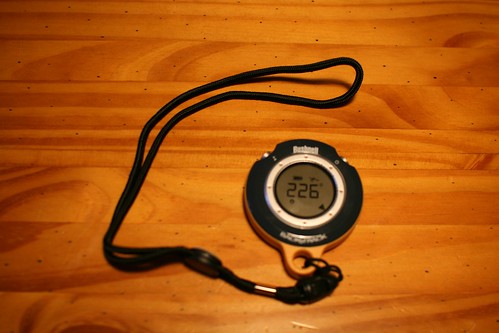People talk a lot about location-based services these days. GPS car navigation system is quite mainstream for a while, geosocial services such as Foursquare or Facebook places are more and more adopted, and media attention is still focusing on the promises of location-based marketing (even though users in Europe seem to be wary about them).

However, there is less focus on more niche products based on similar technologies. My neighbor recently lent me one of these curious location-based service. It's called "BackTrack" and can be defined as a "personal location finder". It's advertised with the following elements:
"BackTrack utilizes GPS technology in its most basic format, BackTrack has only two buttons and stores up to three locations – just mark it and forget it until it’s time to return. At the end of the day, select your location and the BackTrack displays direction and distance to travel. Use it to find your car in a crowded parking lot, your treestand or the trailhead, even to rendezvous with your group."
Or, as described in a very succinct way: "AS EASY AS 1-2-3 Mark it - Go Anywhere - Get Back". The idea is quite good and the interface is very basic (2 buttons, very limited information on the display), which makes it quite easy to use. However, getting GPS signals is sometimes very difficult in the narrow streets of Paris and Geneva (where I tested it). Using it "on the way back" to your reference point, the experience is curious, as you do not necessary take the same route: you then walk, look at the display and check how to move around with the compass. It was not that efficient to find my way back to my hotel in Paris but I enjoyed having these sort of "location-awareness" information. It told me how far how I was from my apartment in Geneva when spending one week in Paris. Not very useful indeed but surely evocative and close to what I expect to encounter in the 21st Century. Accessing this kind of information without specific ideas in mind about how it can be useful, that was intriguing.
Besides, what's interesting here is that the idea is very close to a project I blogged about last year, called "Address necklace by Mouna Andraos and Sonali Sridhar:
"“Address is a handmade electronic jewelry piece. When you first acquire the pendant, you select a place that you consider to be your anchor – where you were born, your home, or perhaps the place you long to be. Once the jewelry is initialized, every time you wear the piece it displays how many kilometers you are from that location, using a GPS component built into the pendant. As you take Address around the world with you, it serves as a personal connection to that place, making the world a little smaller or maybe a little bigger.“"
The Address necklace is of course different, more poetic and evocative than the use cases mentioned for BackTrack ("at the mall and stadium parking lots, at the outdoor festival, the park, for travel or you next outdoor adventure")... and you can set the location only one time (which makes it very precious and important).

Why do I blog this? Testing the Long Tail of location-based services is always interesting to sense what sort of insights these devices can bring us. It also helps to show that there are different ways to use such technologies.